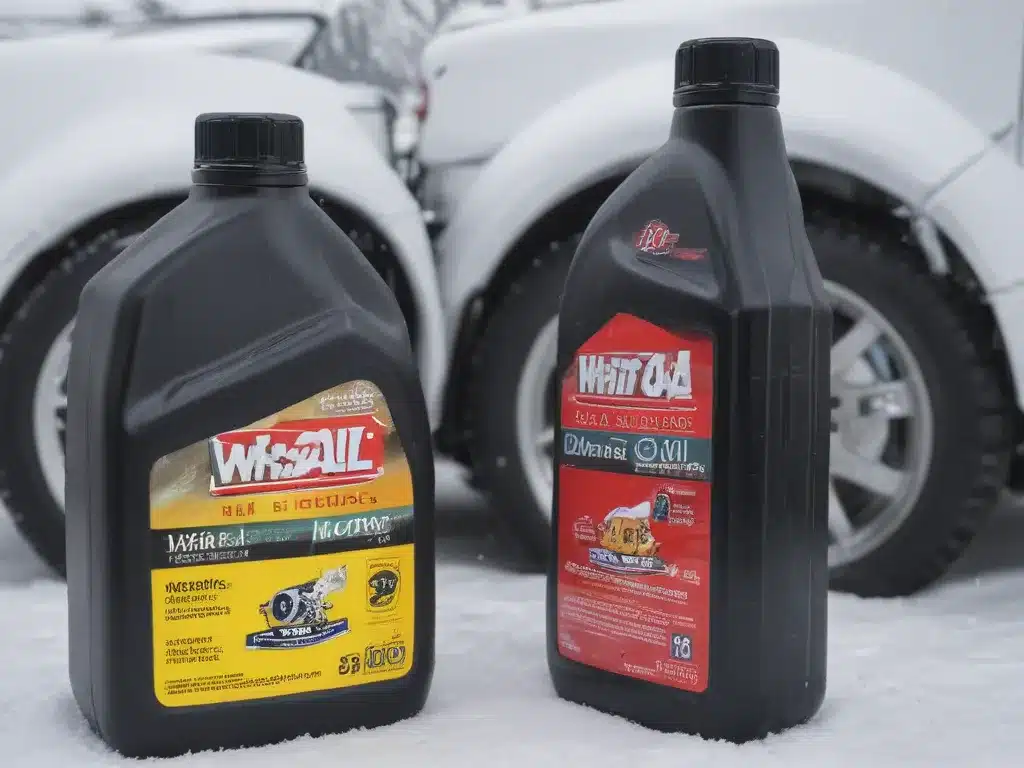
The Great Seasonal Oil Debate
As the seasons change, one of the most common questions that pops up in the automotive world is: “Do I need to switch my motor oil for the summer or winter?” It’s a valid inquiry, and the answer may not be as straightforward as you might think. You see, the type of motor oil you use can have a significant impact on your car’s performance and longevity, especially when the temperature starts to fluctuate.
I’ve been working as a certified auto technician for over a decade now, and let me tell you, I’ve seen my fair share of engine troubles caused by the wrong oil. That’s why I’m here today to dive deep into the differences between summer and winter motor oils, and help you make an informed decision that’ll keep your ride running like a dream, no matter the weather.
Understanding the Viscosity Factor
The single most important factor when it comes to choosing the right motor oil is its viscosity, which is basically a measure of how thick or thin the oil is. This viscosity is denoted by a number-letter combination, such as 5W-30 or 10W-40.
Now, the “W” in that equation stands for “winter,” and the number before it refers to the oil’s cold weather performance. The lower the number, the better the oil will flow when it’s chilly outside. For example, a 5W-30 oil will be thinner and more fluid at low temperatures compared to a 10W-30.
The number after the “W,” on the other hand, indicates the oil’s viscosity at normal operating temperatures. The higher the second number, the thicker the oil will be when your engine is warmed up and running. A 5W-30 oil, for instance, will be less viscous than a 10W-40 when the engine is at its optimal temperature.
This dual-viscosity rating is crucial because it allows the oil to perform well in both cold and hot conditions. During the winter, you want a thinner oil that can circulate quickly and easily, lubricating all those vital engine components. In the summer, a thicker oil is preferred to maintain proper clearances and prevent excessive wear.
Seasonal Oil Recommendations
So, what’s the best motor oil for summer versus winter? Well, it really depends on your specific vehicle and the climate you live in. As a general rule of thumb, though, here’s what I’d recommend:
Summer Driving
For the warmer months, I suggest going with a higher viscosity oil, like a 10W-30 or 10W-40. These thicker formulas will provide better protection against engine wear and tear when the temperatures start to soar. They’ll also help maintain proper clearances between moving parts, which is crucial for optimal performance.
Winter Driving
When the mercury starts to drop, switch to a lower viscosity oil, such as a 5W-30 or even a 0W-20. These thin, free-flowing lubricants will ensure your engine can easily crank and start, even on the coldest of mornings. They’ll also help improve fuel efficiency, which is always a bonus during the winter months.
Now, I know what you’re thinking: “But wait, won’t that mean I have to change my oil more often?” And you’re right, to an extent. Thinner winter oils do tend to break down a bit quicker than their thicker summer counterparts. However, the benefits of using the right viscosity far outweigh the slightly increased maintenance schedule.
Real-World Examples
Let me share a couple of real-life examples to drive the point home.
One of my regular customers, let’s call him Dave, used to religiously stick to a 10W-30 oil year-round. Now, Dave lives in a particularly harsh climate, where the winters can get downright frigid. One morning, he went to start his car, and it just wouldn’t turn over. After a quick diagnosis, we realized that the thick 10W-30 oil had essentially turned to molasses in the cold temperatures, preventing the engine from cranking properly.
We switched Dave over to a 5W-30 for the winter, and the problem was solved. His car now starts up without a hitch, even on the coldest days. Sure, he has to change the oil a bit more frequently, but the peace of mind and improved performance are well worth it.
On the flip side, I had another customer, Sarah, who lived in a warm, sunny climate. She used to run a 5W-30 oil year-round, which worked fine during the winter. However, once summer rolled around, the thin oil started to thin out even more, leading to increased oil consumption and some worrying noises coming from the engine.
After a chat, Sarah agreed to switch to a 10W-30 for the summer months. The thicker oil helped restore proper clearances and reduced the amount of oil her engine was burning. Her car has been running like a dream ever since, with no more unexpected trips to the shop.
The Bottom Line
When it comes to motor oil, there’s no one-size-fits-all solution. The right viscosity can vary depending on the season, your driving conditions, and the specific requirements of your vehicle.
My advice? Always refer to your owner’s manual to see what the manufacturer recommends, and don’t be afraid to experiment a bit to find the perfect oil for your needs. A little trial and error can go a long way in keeping your car happy and healthy, no matter the weather.
And if you’re ever unsure, don’t hesitate to reach out to a trusted auto technician, like myself, for guidance. We’re here to help you make the best decisions for your ride and keep it running smoothly all year round.
Now, if you’ll excuse me, I’ve got to go change the oil on my own car. It’s been a long, hot summer, and I think it’s time to switch to a nice, thick 10W-30. Gotta keep this baby purring like a kitten!


